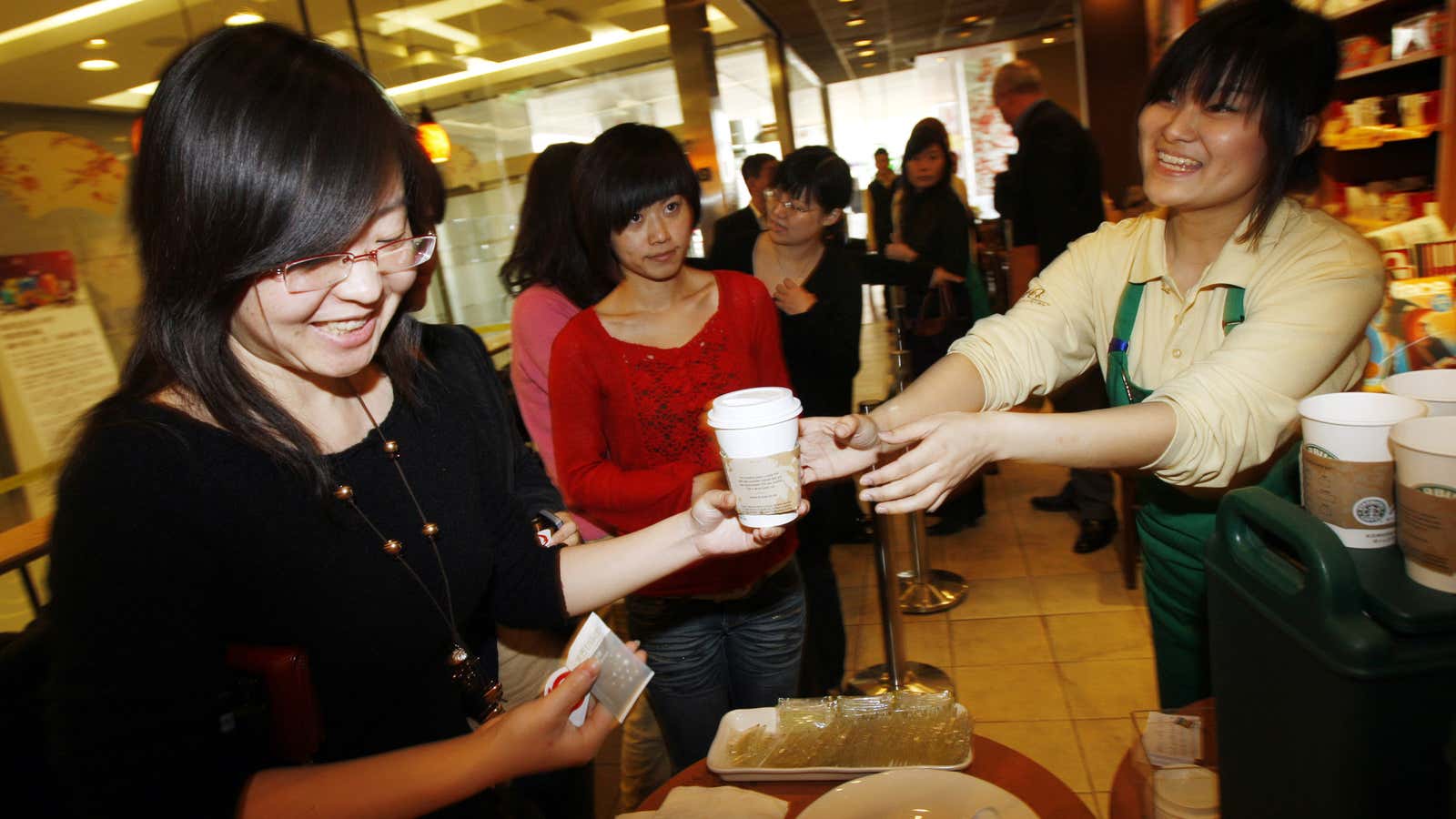This story was updated on Aug. 2 with new details from Starbucks and Luckin Coffee.
Starbucks has said publicly it will ramp up its delivery services across China, as its most recent earnings report showed signs of a potential slowdown in the country.
Chinese media outlet Caijing reported last week (link in Chinese) that Starbucks, in partnership with food delivery service Ele.me, will let Chinese consumers order coffee from their phones starting next month. Ele.me became a subsidiary of Alibaba in April, when the e-commerce giant acquired the startup for $9.5 billion (paywall). Its chief rival is Meituan, a delivery and services provider that recently filed to IPO in Hong Kong.
On Aug. 2, Starbucks confirmed the news, adding that the new delivery service would start in Beijing and Shanghai in September. By the end of the year, it aims to have 2,000 of its outlets across 30 cities participating in the program.
Starbucks will also open kitchens in Hema, Alibaba’s bricks-and-mortar supermarket chain, dedicated exclusively to fulfilling delivery orders.
On July 27, in its financial results for the quarter ending on July 1, Starbucks revealed that comparable store sales in China declined 2% annually. Somewhat worryingly, the drop comes amid a broad expansion in China. Earlier this year, the company said it hopes the country will house 6,000 stores by 2022—roughly double its current count, amounting to a new store opening every 15 hours.
What explains the drop? It’s possible that Starbucks’ new retail stores are cannibalizing sales from its existing ones. But it’s also possible that it’s facing a squeeze from Luckin Coffee, a Beijing-based rival that launched last October. The Chinese company has expanded rapidly, marketing itself with ubiquitous ads, steep discounts, and an aggressive media campaign. Central to Luckin Coffee’s premise is delivery: Half of its outlets are kitchens dedicated solely to fulfilling online orders.
For years, Starbucks operated in China with no serious competition, occupying 58.6% of China’s coffee market in 2016, according to research firm Euromonitor International. Its closest rivals were McDonald’s and Costa, which held 6.1% and 3.8% of the market, respectively.
Even if Luckin Coffee is currently smaller than those companies, Starbucks seems to be aware of its presence.
Speaking to analysts in an earnings call, Starbucks China CEO Belinda Wong stopped short of naming Luckin Coffee directly when discussing rivals. But by noting the competition’s delivery and penchant for discounts, it’s no secret which company Starbucks fears nipping at its heels.
“While recent coffee market entrants have chosen to capitalize on delivery combined with heavily discounted offers, there’s significant compromises at play in terms of quality, experience, and business sustainability. These will prove to be short-lived,” she said. “Let me assure you that our new delivery service will adhere to the high standards our customers in China have come to expect with regard to the Starbucks experience.”
Luckin Coffee is continuing to move quickly. On Aug. 1, as news of Starbucks’ partnership with Ele.me circulated, the startup announced it has opened over 800 outlets, up from more than 500 in May, and intends to reach 2,000 by year’s end. It’s also expanded its food menu.
“We’re very happy Starbucks is entering delivery,” Luckin Coffee said in a statement. “This will give consumers more choice and also will benefit the market through competition that will ultimately serve customers well.”
